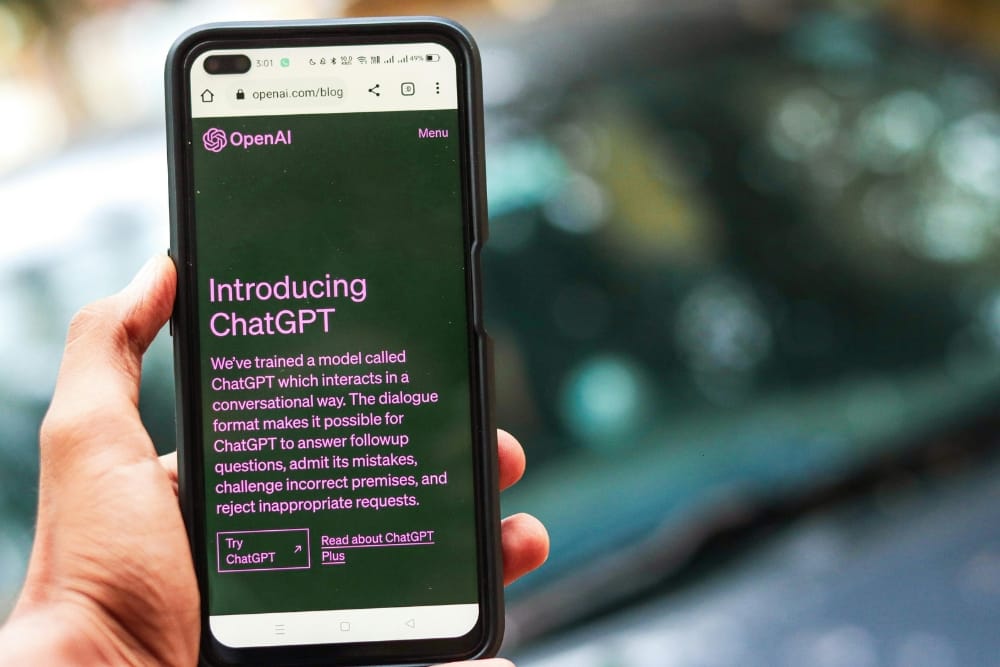If you’re reading this in 2026, you’ve probably noticed something strange: you don’t always click through to websites anymore when you ask something online. Instead, you ask tools like ChatGPT for an “answer,” and sometimes that’s enough.
That shift is no fluke, it’s the start of a new frontier in search. In this world, your website doesn’t just compete to appear in search engine result pages. It competes to be referenced by AI models. Your ranking becomes not about position, but citation.
So if you’re a website owner, an SEO, or a marketer, and you want to rank in ChatGPT (or at least show up in ChatGPT search answers), this guide is for you.
We’ll walk through:
- What “ranking” means in the context of AI and LLMs
- The core differences between AI search and traditional SEO
- Strategies you can adopt now to improve your chances of being cited or surfaced
- How to track and optimise your AI visibility over time
By the time you finish reading, you’ll be able to learn how to rank for ChatGPT, improve your visibility, and begin building authority in the AI search ecosystem.
What Does “Ranking” Mean in ChatGPT & AI Search?
(Hint: It’s not quite like SEO)
When we talk about ranking in ChatGPT, we don’t mean “Page 1, Position 2 on Google.” Instead, we mean:
- Being cited or referenced in the answer ChatGPT gives a user
- Being among the trusted sources the model “relies” on when pulling in external data
- Having your content selected (or “grounded”) as evidence for a recommendation
Because ChatGPT’s responses are generated via LLMs (large language models) and often via retrieval from external sources, “ranking” means “being used as a reference point.”
Here are a few nuances to understand:
- ChatGPT sometimes uses pre‑trained knowledge (information it was trained on) and sometimes fetches newer data via a live search (e.g. via Bing or web APIs).
- Even when relying on live data, ChatGPT doesn’t show 10 blue links, it shows curated answers enriched by knowledge, with occasional citations or suggestions.
- Visibility in ChatGPT is not purely about your domain’s SEO strength. Brand mentions, external citations, reviews, and structure matter a lot more now.
The practice of optimising for AI answers is emerging as GEO (Generative Engine Optimisation), similar in spirit to SEO, but with different levers.
So for “ranking on ChatGPT,” think less about beating competitors in SERPs, and more about being trusted enough to be placed in the model’s answer.
Why You Should Care About ChatGPT Visibility
You might ask: “Why bother? Isn’t Google still where people click?”
Great question. Here’s why AI visibility is becoming non-optional:
- Users are shifting to AI-first search habits. More queries now start in AI tools than traditional search engines.
- Zero-click is baked in. When ChatGPT gives a (good) answer directly, users often don’t click further. So being mentioned or quoted becomes your new “ranking slot.”
- Trust by association. If ChatGPT cites your site, users see you as authoritative even if they don’t immediately land on your site.
- Early adopter advantage. Many brands are still optimised for search engines, not for AI. Getting visible now gives you a head start.
So yes: if you run a website or care about SEO in 2026, your visibility depends not just on Google rankings, but on whether ChatGPT thinks you deserve a spot in its answers.
Core Differences Between SEO and AI Search
To succeed in this new game, you need to see how the playing field has shifted. Here’s a breakdown:
| Feature | Traditional SEO | AI / ChatGPT Search |
|---|---|---|
| What users see | List of web pages in SERPs | Generated answers, sometimes with citations |
| Ranking signals | Keywords, backlinks, domain authority, CTR | Relevance, trust, freshness, structured content |
| Brand mentions | Helpful but secondary | Critical for entity recognition and authority |
| Content structure | Keyword-rich pages, meta tags, H1/H2 | Answer-first, semantically clear, snippet-friendly |
| Updates | Periodic content updates and audits | Real-time freshness; outdated info less likely cited |
| External signals | Backlinks, reviews, and click behaviour | Mentions across LinkedIn, Reddit, Quora and reputable sources |
| User experience | Optimised pages for loading speed and UX | Clear, high-quality answers aligned with user queries |
5 Strategy Pillars to Rank in ChatGPT Search
Let’s dive into actionable strategies you can apply to improve your chances of being cited by AI. Each pillar taps into a different dimension of influence in the AI search ecosystem.
1. Build Topical Authority & Brand Mentions
If ChatGPT is going to rely on you, it needs to “know” you. That happens when your brand or site is repeatedly mentioned in contexts relevant to your niche.
- Get cited in industry blogs, reports, and articles. Being referenced by others builds your “footprint” in the training data and external networks.
- Use digital PR: pitch to journalists, guest post, participate in interviews, be a source for trends.
- Engage in communities (Reddit, Quora, LinkedIn, podcasts). Every mention helps the model associate your brand with topic clusters.
- Build backlinks, but think of them more as identity markers for the AI to pick up associations.
Brand mentions and topical depth are among the strongest signals ChatGPT uses to decide which sources to include in answers.
Example: If you run a SaaS for email marketing, you might aim to be quoted in a “Top Email Tools 2025” article or featured in a newsletter on MarTech trends. That mention helps AI connect your brand with email tools.
2. Allow AI Crawlers to See You (Technical Setup)
You might have stellar content, but if ChatGPT (or its underlying crawlers) can’t access it, you’re invisible.
- Check your robots.txt and security rules to ensure AI bots like GPTBot aren’t blocked.
- Be careful with firewalls, bot protection, or anti-scraping rules that might inadvertently block AI access.
- Use schema markup / structured data (JSON‑LD), especially for Article, FAQ, HowTo, Review types. Many pages cited by ChatGPT include structured data.
- Make your page structure clean, headings explicit, and content properly indexed.
If AI can’t parse your content, you lose even before competition begins.
3. Optimise with Answer-First, Structured Content
To be cited, your content needs to be grab‑friendly. That means:
- Lead with the direct answer early (within first 1–2 paragraphs or in a summary).
- Use clear headings (H2, H3) that mirror query phrasing or common prompts (e.g. “How to do X,” “What is Y?”).
- Use bullet points, numbered steps, tables, or lists for clarity.
- Break content into small logical chunks so that AI can easily extract a passage.
- Anticipate follow-up queries and include mini-FAQs inside the content.
This answer-first format is a top strategy to rank on ChatGPT.
Example:
If someone queries “How to reduce churn in SaaS,” your article might start:
Answer: “To reduce churn in SaaS, focus on onboarding, engagement, exit feedback loops, and predictive analytics.”
Then, you break down each piece in subsections.
By giving that crisp first answer, you increase the chance AI will quote your snippet in responses.
4. Keep Your Content Fresh, Accurate & Evolving
One mistake many make is “write once, forget forever.” With AI, staleness is death.
- Regularly refresh your content like updating statistics, industry trends, case studies.
- Set “content refresh cycles” (e.g. every 6 months for pillar content).
- Monitor your pages for outdated claims or broken links; AI may penalise content that seems unreliable or obsolete.
- Add recent citations, updated sources, and date stamps.
- Expand your core topics over time by branching into related queries.
AI tools often prefer newer sources, so freshness gives you an edge.
5. Encourage Reviews, Sentiment, & Rich Mentions
AI doesn’t just see your content. Tt sees what people are saying about it across the web. These external signals matter.
- Encourage customer reviews on platforms relevant to your niche (trust sites, product directories, forums).
- Use review schema on your website to bring in external signals.
- Get mentioned in listicles, comparison posts, and user-generated content (e.g. a Reddit thread “Best X tools”).
- Monitor sentiment: negative or spammy signals hurt your brand’s trust.
- Integrate user testimonials, case studies, and social proof into your content.
“Want to rank on ChatGPT? You need reviews on multiple platforms.”That captures how external sentiment and signals act as “validation data” for AI models.
Ready to rank in ChatGPT, not just Google?
Let’s boost your visibility in AI search, optimise your content for LLMs, and leave outdated SEO behind.
A Workflow to Start Ranking
Here’s a step‑by‑step process you and your SEO team can use to begin working toward ChatGPT visibility:
1. Audit your site for AI readiness
- Crawl your robots.txt, verify AI bots aren’t blocked.
- Check pages for schema markup.
- Ensure your core content is structured and answer-oriented.
2. Identify priority topics/queries
- Use tools like Semrush, AnswerThePublic, internal analytics to find high‑intent, question-style queries.
- Choose topics where you have competitive expertise or authority.
3. Create or refresh content
- For priority topics, build answer-first content with good structure.
- Refresh older posts in your niche to ensure they remain relevant and compete well.
4. Build external visibility
- Reach out for guest posts, quotes, interviews, mentions.
- Participate in communities, answer questions on Quora and Reddit.
- Encourage reviews and testimonials.
5. Track AI citations and refine
- Use tools like Ahrefs’ “Brand Radar ChatGPT” to see where your brand is being cited in ChatGPT.
- Test queries (“incognito, logged out”) multiple times to see if your content shows up.
- Refine content structure, update signals, and deepen topical coverage where you see gaps.
6. Repeat, iterate, evolve
- This is a long game. AI models evolve, so your content, signals, and authority must grow too.
Common Challenges & Pitfalls (So You Don’t Trip Up)
- Thinking keywords = citations. You can rank well in SEO yet never be cited by ChatGPT if your brand lacks external presence or perceived authority.
- Over-optimising or stuffing. AI models prefer natural language. Keyword stuffing or robotic phrasing isn’t just outdated, it’s officially penalised. The August/September 2025 Spam Update made it clear: low-value, AI-generated fluff or manipulative content structures are now being actively filtered out by both traditional search engines and AI search tools.
- Blocking crawlers unknowingly. Many sites unintentionally block AI bots like GPTBot or Bing’s AI crawlers. If they can’t access your site, they can’t cite you.
- Letting content stagnate. Outdated information doesn’t just rank lower—it can actively hurt your brand’s credibility in AI-generated answers. Keep your content fresh and factually relevant.
- Ignoring external signals. Your content might be brilliant, but if no one talks about you online, AI models won’t recognise you as a trusted source.
- Expecting overnight results. Ranking in ChatGPT or Bing’s AI search isn’t a short-term win, it’s a slow build of topical authority and trust.
What the Future Holds
We’re still in the early days of AI-powered search. The rules will evolve: LLMs may weigh signals differently, new citation formats may emerge, and search may become even more conversational.
But here’s what’s likely:
- Entity-driven search: AI will increasingly rely on strong entity graphs. The more your brand is connected across contexts, the better.
- Personalisation: Searches may bias toward what the model knows about you, which makes owning your digital footprint even more critical.
- Interactivity with LLMs: You may be able to directly “opt in” to be cited or supply structured data to models.
For now, you win by building solid foundations such as content, authority, structure, and reputation.
Your Next Steps Toward AI Visibility
In 2026, the question is no longer just how to rank on Google, but how to rank on ChatGPT and AI search more broadly. Visibility will come from being trusted enough to be cited, not just clicked.
If you want to build a content strategy that feeds both SEO and AI visibility, focus on:
- Authority and brand mentions
- Structured, answer-first content
- Technical accessibility
- External reviews and signals
- Freshness and ongoing refinement
We’re proud to say: our clients are already getting cited on AI by ChatGPT, and not just by chance—they’ve scored placement in answers and recommendations. Want yours too?
Let’s talk about how we can help your website start appearing in ChatGPT search results, build your authority with generative engines, and secure long-term visibility in the AI era.





